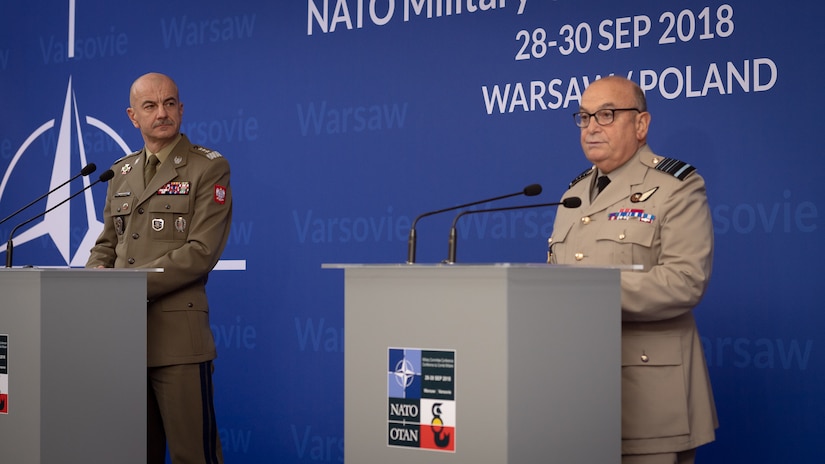By Jim Garamone, DoD News, Defense Media Activity
WARSAW, Poland -- Russia is disturbing the peace, and NATO
countries must combat its hybrid strategy, the alliance’s supreme allied
commander for Europe said here today.
Army Gen. Curtis M. Scaparrotti, who also commands U.S.
European Command, spoke to reporters covering the NATO Military Committee
meeting here, alongside Marine Corps Gen. Joe Dunford, the chairman of the
Joint Chiefs of Staff.
Scaparrotti said Russia already is a competitor that
operates in domains “particularly below the level of war,” the general said,
but in an aggressive way, noting that the Russians use cyber activity, social
media, disinformation campaigns and troop exercises to threaten and bully other
countries. Russia’s illegal annexation of Crimea in 2014 and its actions
Eastern Ukraine show their determination to continue to intimidate neighboring
countries.
Undermining Western Values, Governments
“[They are] operating in many countries of Europe in that
way, with basically the common theme of undermining Western values and the
credibility of Western governments, in my view,” Scaparrotti said.
Short of conflict, Russia sends money to organizations in
Europe at both ends of the ideological spectrum, the general said. “Really,
their view is -- I call it a destabilization campaign. That’s their strategy,”
he added. “If they can destabilize these governments, if they can create enough
questions, then that is to their benefit.”
The Russians’ doctrine looks to achieve their ends without
conflict, Scaparrotti said. “They have the idea that ‘I don’t have to put a
soldier there or fire a shot, but if I can undermine the government, then I’ve
achieved my ends,’” he explained. “That is particularly true of the countries
that are in the Eastern part of the alliance that are on their border.”
The Soviet Union subjugated those countries after World War
II, and Russia sees those countries as areas where it should still have
privileged influence, he said. “They want to keep those governments in the
position that they could influence them, and this is a tactic for doing that.”
The environment surrounding t has changed, he noted. “They
were ahead of us in terms of changing their posture with respect to NATO,” he
said, and the Russians have maintained a purposeful military modernization
program that they have maintained even as their economy strains.
“It took us some time in NATO to recognize that [Russia] is
not our friend, not our partner right now, and we have to pay attention to
what’s happening in our environment and how they are acting,” he said. “Of
course 2014 was a real wake-up. Russia violated international law and norms,
which I will tell you they continue to do in other ways.”
Scaparrotti said he has no doubt that Russia would repeat
its actions in Crimea and Ukraine “if they saw the opportunity and they thought
the benefits exceeded the costs.”
This strategy is called a hybrid war, he said, and NATO is
coming to grips with the concept. “One of the things about hybrid war is
defining it. What is it?” he added. “It’s a lot of things, and most of it is
not in the military realm.”
Whole-of-Government Approach
Planners need to determine what the military can do as part
of a counter-strategy and what other agencies, branches efforts can contribute,
he said. “And then [you must decide] how should you work with them, because we
can’t just work on this on our own,” he said. “This really does talk about the
whole-of-government approach and bringing others into it and deciding what
needs to be done.”
In each NATO nation that approach has got to be different,
Scaparrotti said, because the nations themselves have different strengths,
weaknesses and vulnerabilities. They also must factor in what Russia’s interest
or activity is.
“We are working in this realm with military capacity as
well,” the general said. “We have special operations forces, and this is their
business. They understand it. To the extent that they can identify hybrid
activity, they can help our nations build their ability to identify and counter
it.”
NATO can, for example, reinforce each nation’s capacity for
understanding disinformation and how to counter it, he said, noting that these
issues are among the Military Committee meeting’s topics..
The bottom line is that Russian leaders need to understand
that a conflict with NATO is not what they want, Scaparrotti said. “We are 29
nations. We’re strong. I am confident of our ability to secure the sovereignty
of our nations in NATO,” he said.
Readiness Critical to Deterrence
NATO readiness is crucial to the deterrent success of the
alliance, and Scaparrotti now has the tools to work on this aspect. Readiness
in NATO means the commander gets a specific capability, and that capability is
available on a timeline that’s useful given the environment, he explained.
“Then, of course, [readiness] is a mindset, which is perhaps
the most important thing that has changed,” he said. “It is changing now.”
The NATO summit held in Brussels in July gave Scaparrotti
the authority and directive to deal with alliance readiness.
“We are back to establishing force where I, as the
commander, now have the authority to require readiness of units on a specific
timeline and the ability to check them to ensure they can actually do it,” he
said. “This all comes together with our ability to move at speed to meet the
environment to do what we need to do.”






